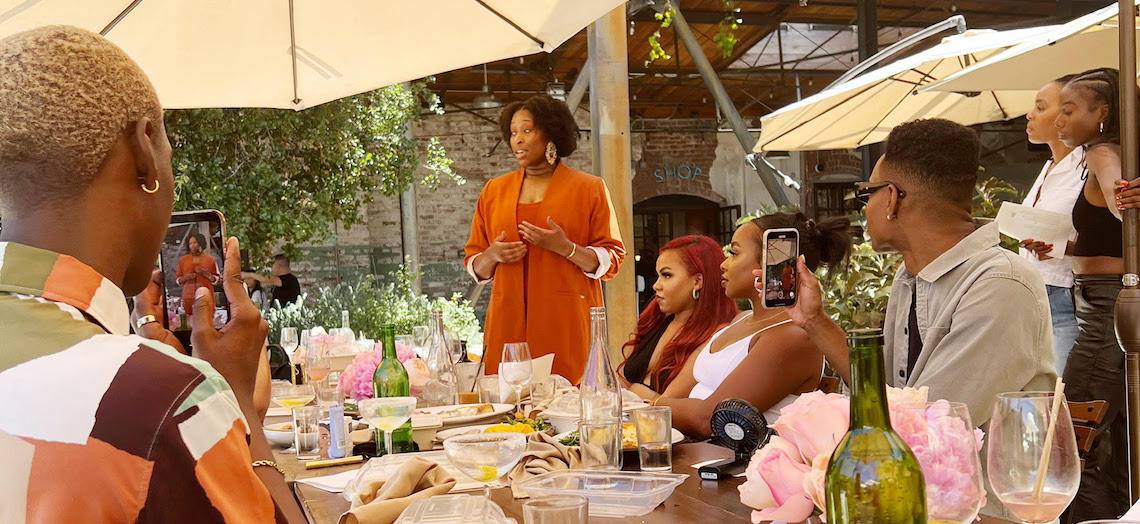Two years after beauty brands, influencer agencies and tech platforms promised to incorporate more diversity into their influencer marketing, BIPOC influencers are the ones ensuring progress continues.
On June 26, a group of Black influencers gathered in L.A. for the first Black Creator Brunch. Organized by skin-care influencer Quani Burnett, the event was sponsored by a group of indie beauty brands including Supergoop, Paula’s Choice, Versed and Briogeo. Also in June, Sephora announced that the new 2022 roster of its influencer program Sephora Squad is made up of 78% BIPOC creators, up from 61% in 2019. These recent initiatives have come to remind the industry of its need for diversity, especially in the influencer economy, where inequality remains well documented.
“There are so many more people that don’t get that ability to be highlighted and be amplified,” said Burnett, of why she organized the brunch for a group ranging from nano- to macro-creators. Among the attendees were influencers who “had never been invited to a brand event,” she said. At the event, the influencers were introduced to brand founders, added to brands’ PR lists and given the opportunity to receive a free professional headshot. Burnett plans to expand her initiative to create an organized group and host regular events. “I want to be able to widen that reach,” she said.
“I am so honored to have been a part of the first annual Black Creator Brunch to uplift and celebrate the incredible work that Black influencers put into the beauty space,” said fashion and beauty influencer Tennille Murphy. “For many of the guests in attendance, this was their first influencer event.”
Jamie Peraza, senior program manager of Versed, saw the event as a way to level the playing field. “Creating experiences and opportunities for Black creators to be centered, celebrated and discovered within the beauty space is a crucial step in democratizing beauty,” she said, of Versed’s sponsorship of the brunch. “It’s important for us to use our platform to bring visibility and access to marginalized, underrepresented and historically excluded communities.”
The influencer industry saw calls for change in 2020 as BIPOC influencers spoke out about the inequality they’ve have seen in the industry. These included brand campaigns with little to no diversity, tokenism in campaigns, access to fewer brand partnership opportunities and pay disparities based on race. As part of the wave of industry pledges as part of the Black Lives Matter movement, brands and agencies promised to create more diverse campaigns and equal pay practices.
But “there’s still work that needs to be done,” said Burnett. According to 2021 data from communications company MSL and educational organization The Influencer League, the pay gap between white and BIPOC influencers is 29%, and increases to 35% specifically for Black influencers.
Ad position: web_incontent_pos1
Influencers are also facing challenges with social platforms. Black TikTok creators went on a content strike last year after white creators used their choreography and did not credit them. Those same white creators subsequently scored massive brand deals. The issues still exist today.
“We push the trends; we really push the creativity and the boundaries. But we don’t always get that credit,” said Burnett.
The Sephora Squad, meanwhile, launched in 2019 with the goal of “cultivating one of the industry’s most diverse influencer groups, using our platforms to build a beauty community where all feel that they belong [and] where audiences see themselves in the content creators we partner with,” said Abigail Jacobs, svp of integrated marketing at Sephora. Jacobs added that participating influencers are considered for future campaigns and that Sephora is in the process of organizing an “alumni group” for participants from earlier years.
The 55 new Sephora Squad members, including Olympic gold medalist Kendall Ellis, Columbia Law graduate and makeup influencer Eni Popoola, and TikTok skinfluencer Young Yuh, receive a paid partnership to work on campaigns throughout the year, as well as networking opportunities with industry leaders and brands via events and trainings. According to Sephora’s data, TikTok follower counts increased 53% for the 2021 members, who participated in events with celebrity and influencer beauty founders including Patrick Starr, Huda Kattan, Dr. Dennis Gross and Jennifer Lopez.
According to Jacobs, the Squad is a “critical component” of Sephora’s 2020 action plan to combat racial bias in retail to “ensure the creatives, talent and teams behind the scenes, as well as the content itself, include a variety of perspectives and backgrounds.”
Ad position: web_incontent_pos2
For Burnett, it is important to create opportunities for influencers to “come together, hold space, commune and share with one another.”
“We encouraged one another, shared words of wisdom and made genuine connections that will serve us in our endeavors,” she said.




